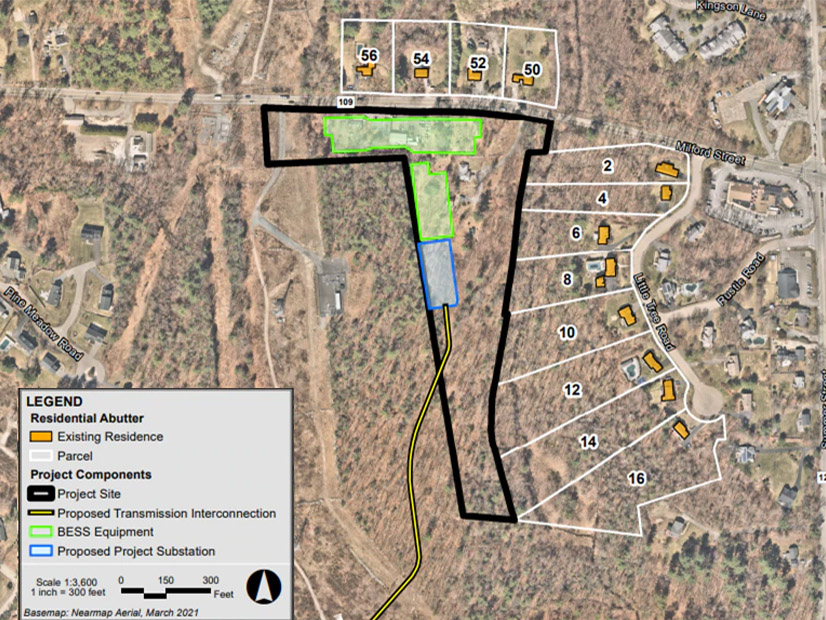
The Massachusetts Department of Public Utilities has cleared the way for construction of two major battery facilities that would get the state most of the way to its 2025 energy storage goals.
After an extended planning and review process, the Medway (Mass DPU 22-59) and Cranberry Point (Mass DPU 22-18) projects suffered setbacks when the state Energy Facilities Siting Board (EFSB) decided May 11 that it lacked jurisdiction over battery energy system storage (BESS) proposals because they were not energy generation facilities.
That move sent the proposals to the DPU for review. This, combined with earlier delays, made developers fear they would miss their contractual obligation with ISO-NE to come online by June 1, 2024, potentially opening them to millions of dollars in penalties.
On Friday, the DPU issued rulings exempting the two projects from local zoning rules, effectively greenlighting both, though with a lengthy list of conditions on design and construction.
In an email to NetZero Insider this week, Plus Power, which owns the LLC developing Cranberry Point, declined to predict whether it could pull permits and start and finish construction in 11 months.
But CEO Brandon Keefe said: “We thank Massachusetts’ leadership for making this decision based on the facts of regional need, project design, minimal environmental footprint and safety best practices. Battery energy storage is already widely deployed across the country to help decarbonize and modernize electric grids. The Cranberry Point Energy Storage project will be a critically important asset to improve power reliability and clean electricity for Southeast Massachusetts.”
Cranberry Point Energy Storage is a 150-MW/300-MWh BESS proposed by Plus Power in Carver, northeast of Fall River; a short overhead power line to an existing substation is part of the project.
Medway Grid Energy Storage System is a 250-MW/500-MWh BESS proposed by Eolian Energy in Medway, northwest of Fall River. The project also includes an underground line running to an existing substation.
Together, they would provide 80% of the 1,000-MWh goal Massachusetts has set for Dec. 31, 2025, under its Energy Storage Initiative.
Large-scale storage is expected to play a critical role in the clean energy transition as the grid increasingly relies on intermittent generation resources and traditional patterns of electric consumption change.
‘Different World’
The long-running deliberation by the EFSB was a source of frustration for the developers of the two projects but was not fruitless: The extensive record it established enabled DPU to move quickly on the proposals.
However, the matter also highlighted the need to revise decades-old regulatory language codified long before utility-scale energy storage was contemplated.
When the EFSB punted to the DPU, a spokesperson for Gov. Maura Healey’s Office of Energy and Environmental Affairs addressed this shortcoming, telling NetZero Insider the EFSB is guided by statute.
“As the case before the board today demonstrates, that statute was designed for a different time when the power system was based on large fossil fuel power plants owned by utilities. Today, we live in a different world,” the spokesperson said. “This is why EEA Secretary [Rebecca] Tepper established a commission on permitting and siting to assess and address the jurisdiction around building large amounts of renewables in an equitable manner. It is critical that we as a state review our regulatory scheme to ensure we can site the renewables that we need to meet our energy and climate goals.”
BESS facilities have a lower profile than some other components of a carbon-free power grid, with none of the imposing height of wind turbines and horizontal sprawl of solar arrays. But a spate of intense fires in consumer-scale lithium batteries has prompted pushback from residents who live near proposed BESS sites and are worried that utility-scale lithium battery systems pose an exponentially larger threat than e-bike batteries.
The similarities between the two types of batteries start and end at the word “lithium,” but that distinction can be lost on people who do not work in the battery or firefighting industries.
The DPU addresses safety concerns in conditions it sets for construction of Cranberry Point and Medway, which require developers to:
-
-
- update the DPU regularly on completion of their hazard mitigation analyses and emergency response plans;
- detail in those plans the personnel, equipment and apparatus required to respond to a significant thermal event;
- work with the local fire departments on providing real-time notification to nearby residents;
- develop an evacuation and/or shelter-in-place protocol during emergencies;
- report to the DPU within seven days any incident that requires fire department notification; and
- comply with state regulations on PFAS.
-
Also, the companies must submit plans to ensure that any firefighting water is fully contained in stormwater basins and does not discharge from the basin or otherwise seep into the ground. The DPU directed them to submit a plan to collect and test samples of the water and report the results back to the DPU.

